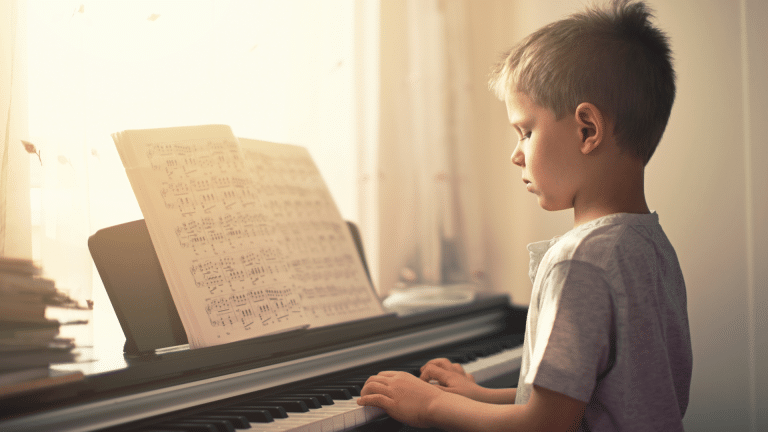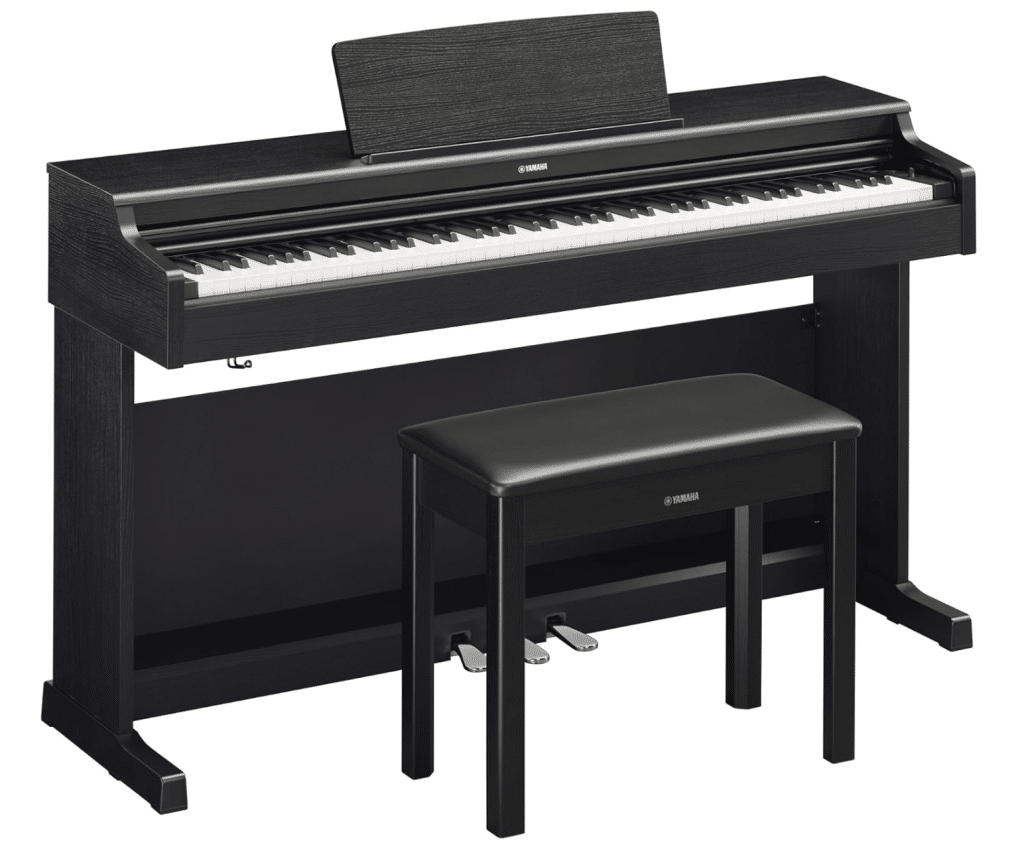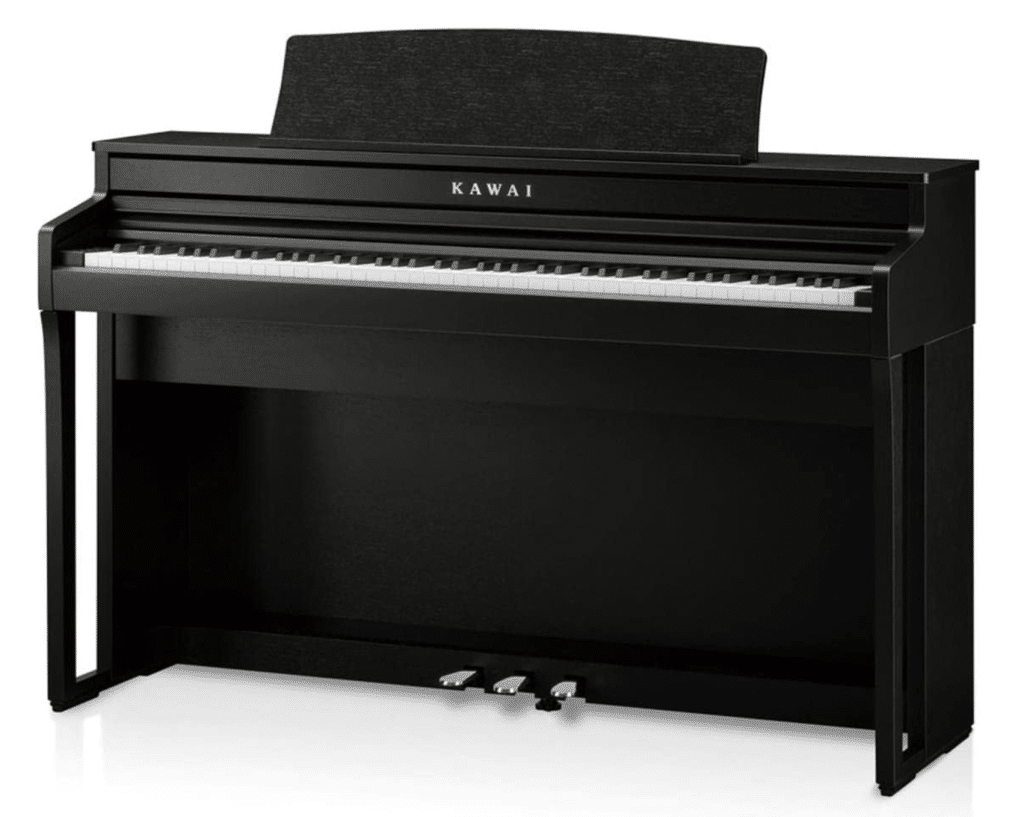A Buyer’s Guide for Beginner to Experienced Piano Players
Whether your child is a complete beginner or an experienced piano student, this guide will help you decide what piano will best fit your needs.
Keyboard, Digital Piano, and Acoustic Piano. What are the differences?
There are lots of options when it comes to pianos. Let’s go over the main features of each.
Keyboards

A keyboard is an electronic piano that also features sounds of other instruments such as strings, brass, organ and voice. A beginner keyboard can range from $50 to $175 and often has 61 or 76 keys compared to a piano which has 88. The keys are generally very light and weightless to the touch.
A 61 or 76 key keyboard is not suitable for proper piano learning and development. A full 88 key piano is essential.
Because a cheap keyboard is very light to the touch a student will not develop the proper technique to play a real piano appropriately and will likely develop bad habits that are hard to break. I believe the earlier a student learns proper piano technique the greater success they will have in their piano journey.
Digital Pianos

A digital piano is a much higher quality keyboard designed to imitate the sound and the feel of an acoustic piano. They feature a full 88 keys like an acoustic piano and also have weighted keys so the feel is similar to an actual acoustic piano.
Pros of Digital Piano:
- Portability: Digital pianos are often lighter and smaller than acoustic pianos, making them easier to move and store.
- Cost: Digital pianos are often more affordable than acoustic pianos, making them a good choice for beginner or budget-conscious shoppers.
- Versatility: Digital pianos often have a range of sounds, styles, and effects that can be used to enhance musical performance.
- Convenience: Digital pianos often have built-in speakers, making it easier to practice and play without the need for additional equipment.
- Record and Playback: Digital pianos often have the ability to record and playback performances, allowing for practice and self evaluation.
Cons of Digital Piano:
- Lack of natural sound: Digital pianos may not sound exactly like acoustic pianos, lacking the natural sound and resonance of a real piano.
- Limited Dynamics: Most digital pianos have limited dynamic range and touch sensitivity, making it more difficult to control volume and expression.
- Requires Power: Digital Pianos require power to operate, which can limit their use in certain locations or circumstances.
- Potential for Technical Issues: Digital pianos rely on electronic components, which can be prone to technical issues, such as software bugs or hardware failures.
- Expensive Upgrades: Digital pianos may need upgrades or repairs over time, which can be expensive, especially if the instrument is out of warranty.
Below are my top recommendations for digital pianos:
Acoustic Pianos


An acoustic piano is a musical instrument that produces sound through the vibration of strings struck by hammers, which are then amplified by a soundboard. Acoustic pianos do not need to be plugged in and do not have any electronic components.
Pros of Acoustic Piano:
- Natural Sound: Acoustic pianos have a rich and natural sound, due to their strings, hammer, and soundboard.
- Dynamics: Acoustic pianos offer greater dynamic control, allowing players to express their musical ideas with more nuance and precision.
- No Power Needed: Acoustic pianos do not require electricity to operate, making them a versatile option for musicians who want to play in a variety of locations and circumstances.
- Longevity: With proper care, an acoustic piano can last for decades or even centuries, making it a good investment for serious musicians or piano lovers.
- Classic Look: Acoustic pianos have a classic look and feel that can enhance the decor of a home or performance space.
Cons of Acoustic Piano:
- Size and Weight: Acoustic pianos can be quite large and heavy, making them difficult to move and store.
- Maintenance: Acoustic pianos require regular maintenance to keep them in good working order.
- Volume: Acoustic pianos can be quite loud, which can be a problem in homes or other settings where quiet is necessary.
- Limited Features: Acoustic pianos typically have fewer features than digital pianos, such as built-in speakers or recording capabilities.
- Cost: Acoustic pianos are often more expensive than digital pianos, especially when considering the cost of tuning and maintenance.
Biggest Mistakes to Avoid When Buying an Acoustic Piano
- Buying a Used Piano Without a Thorough Inspection: You can hire a qualified piano technician to inspect a used piano prior to purchasing, that way you avoid making a purchase only to find out there is a major issue with the piano.
- Lack of Regular Maintenance: All acoustic pianos should get serviced once to twice per year to prolong its life. Without regular maintenance, your strings will go out of tune and the soundboard may crack.
- Buying a Baby Grand Piano: Baby grands have the same string length as an upright piano but the cost is drastically more. It makes more sense to go with a full size grand piano or an upright instead of a baby grand.
- All Acoustic Pianos Are the Same: Just like cars, there are many brands out there, and they vary in quality. I recommend pianos from renown brands such as Steinway and Sons, Schimmel, YAMAHA, or KAWAI.
What Makes a Good Acoustic Piano?
A good piano is at least 51 inches long and that the soundboard is free from cracks. The length of the strings in a piano are very important. Longer strings in a piano produce a deeper and more resonant sound, with a greater projection and sustain. The longer the strings, the better the piano sounds.
Pianos with long strings are also easier to play and control compared to short stringed pianos, because the touch and the action of the keys are more responsive and nuanced.
The soundboard is a critical component of an acoustic piano that plays a vital role in producing the instrument’s sound. The soundboard stays healthy by keeping the humidity level inside the piano between 40% to 45%. Once the soundboard has a very small crack, it will immediately effect the quality of sound negatively.
Purchasing an acoustic piano can be overwhelming, however, an experienced piano teacher should be able to help you.
I have two professional grand pianos myself and believe having a good acoustic piano is essential for the study and performance of classical piano. It is an investment that will pay dividends for a lifetime.
If you have any questions, feel free to leave a comment below and I’m happy to help!





